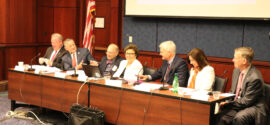Update on the Connecticut Longitudinal Study (CLS)
Much of this new scientific understanding of dyslexia has emerged from a longitudinal study, the Connecticut Longitudinal Study (CLS) that we initiated in 1983 and which Dr. Sally Shaywitz has led and overseen since. Now in its 39th year we continue to follow 82% of the original cohort and have just begun a new phase of the study, the Wellbeing phase. Much of what is known about the science of dyslexia has come from the CLS. Data from the CLS have shown the prevalence of dyslexia—dyslexia affects 20% of the population, 1 in 5 children, 12 million children in the US. Every class has children who are struggling readers. The CLS data are critical because schools very often fail to identify dyslexia in their students. In fact there is a vast difference in prevalence rates of dyslexia reported by schools (0 to 3%-4%) and the prevalence in a scientific study like the CLS in which every student is assessed for dyslexia (20%). As Dr. Sally Shaywitz emphasizes, to be counted, you must first be identified. If you are not identified, you cannot be counted.
Another important finding from the CLS is that dyslexia affects both boys and girls equally. Before we published our findings in the Journal of the American Medical Association in 1990, the dogma was that dyslexia only affects boys. In the three decades since we published our findings that dyslexia affects girls and boys equally, many dyslexic girls are receiving the help they deserve. As an example, in specialized schools for dyslexia, about half the dyslexic students are girls.
One of our most important findings from the CLS is that the achievement gap between typical and dyslexic readers occurs early, as early as first grade, and persists. This finding, published in the Journal of Pediatrics in 2015, was so profound that it mandated that we develop an evidence-based screener to identify children at-risk for dyslexia as early as kindergarten and first grade. We will discuss this screener, The Shaywitz DyslexiaScreen, in subsequent posts to this website.
Related

Congressional Dyslexia Roundtable
Excited, we have unusually positive news to share about science, dyslexia and legislation. Far too often there is …
Read MoreCoursera: Exciting New Online Dyslexia Course
A very exciting announcement that positively impacts children with dyslexia, their parents and their teachers is the Dyslexia …
Read MoreWho will be the first civilian in space? A dyslexic of course—Sir Richard Branson.
Who will be the first civilian in space? A dyslexic of course—Sir Richard Branson. On Sunday, Sir Richard …
Read MoreYCDC Co-Director Dr. Sally Shaywitz was recently featured on the “Learn Smarter” podca..
YCDC Co-Director Dr. Sally Shaywitz was recently featured on the “learn Smarter” podcast. In these informative and engaging …
Read More